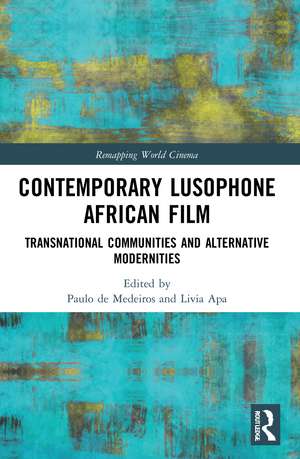Contemporary Lusophone African Film: Transnational Communities and Alternative Modernities: Remapping World Cinema
Editat de Paulo de Medeiros, Livia Apaen Limba Engleză Paperback – 27 mai 2024
The collection brings together 11 chapters by recognized scholars, who analyze a variety of films and videos from Angola, Cape Verde, Guiné-Bissau, and Mozambique. It also includes an interview with Pedro Pimenta, one of the most distinguished African film festival organizers. Drawing on various theoretical perspectives, the volume strives to reverse the relative invisibility that has afflicted these cinemas, arguing that most, if not all, Lusophone films are transnational in all aspects of production, acting, and reception. The initial three chapters sketch broad, comparative overviews and suggest theoretical approaches, while the ensuing chapters focus on specific case studies and discuss a number of key issues such as the convergence of film with politics, the question of gender and violence, as well as the revisiting of the period immediately following independence. Attention is given to fiction, documentary films and recent, short, alternative video productions that are overlooked by more traditional channels. The book stresses the need to pay attention to the significance of African film, and Lusophone African film in particular, within the developing field of world cinema.
Bringing together general overviews, historical considerations, detailed case studies, and focused theoretical reflections, this book is a significant volume for students and researchers in film studies, especially African, Lusophone cultural studies, and world cinema.
| Toate formatele și edițiile | Preț | Express |
|---|---|---|
| Paperback (1) | 387.83 lei 6-8 săpt. | |
| Taylor & Francis – 27 mai 2024 | 387.83 lei 6-8 săpt. | |
| Hardback (1) | 1001.70 lei 6-8 săpt. | |
| Taylor & Francis – 14 dec 2020 | 1001.70 lei 6-8 săpt. |
Preț: 387.83 lei
Nou
Puncte Express: 582
Preț estimativ în valută:
74.21€ • 77.69$ • 61.40£
74.21€ • 77.69$ • 61.40£
Carte tipărită la comandă
Livrare economică 05-19 aprilie
Preluare comenzi: 021 569.72.76
Specificații
ISBN-13: 9780367523169
ISBN-10: 0367523167
Pagini: 224
Ilustrații: 68
Dimensiuni: 156 x 234 mm
Greutate: 0.41 kg
Ediția:1
Editura: Taylor & Francis
Colecția Routledge
Seria Remapping World Cinema
Locul publicării:Oxford, United Kingdom
ISBN-10: 0367523167
Pagini: 224
Ilustrații: 68
Dimensiuni: 156 x 234 mm
Greutate: 0.41 kg
Ediția:1
Editura: Taylor & Francis
Colecția Routledge
Seria Remapping World Cinema
Locul publicării:Oxford, United Kingdom
Public țintă
Postgraduate and UndergraduateCuprins
Introduction: Situating Lusophone African Cinema ; 1. Lusophone African Cinema as World-Cinema ; 2. Lusophone Filmmaking in the realm of transnational African cinemas: from ‘global ethnic’ to ‘global aesthetic’ ; 3. Sounds of Liberation: Sarah Maldoror’s Sambizanga (1972) and Miguel Gomes’ Tabu (2012) ; 4. Resistance and Political Awareness Through the Eye-Camera of Sarah Maldoror ; 5. The eleventh island: Cape Verde, the moving images and its diaspora ; 6. Postcolonial Testimony and the ruins of empire ; 7. In the Name of the Rosa: The Ethnographic Reflex in the Cinema of Licínio Azevedo ; 8. From the tabanca to Bissau, from Bissau to the Diaspora: Social Narratives in the Bissau-Guinean Popular Cinema ; 9. The Representation of Ritual and Cinema as a Ritual in Revolutionary Mozambique: Ruy Guerra’s ‘Mueda, Memória e Massacre’ ; 10. A melancholic outlook on 40 years of lusophone audio-visual production and Guinea, the two faces of the war as case study ; 11. ‘We need to dress ourselves in the black light’: an authorial analysis of Lusophone African cinema - Flora Gomes’s case ; 12. Pedro Pimenta, in Interview with Livia Apa
Notă biografică
Paulo de Medeiros is Professor of English and Comparative Literary Studies, with a focus on Modern and Contemporary World Literatures, at the University of Warwick. As member of the Warwick Research Collective, one of his current projects is a study of Postimperial Europe.
Livia Apa is a member of the Center for Studies on Contemporary Africa (CESAc) at the University of Naples 'L’Orientale'. She works on literary and cultural studies in Portuguese-speaking countries, focused on African cinema, migrations, and cultures of the diaspora, linguistic rights, and contemporary African thought.
Livia Apa is a member of the Center for Studies on Contemporary Africa (CESAc) at the University of Naples 'L’Orientale'. She works on literary and cultural studies in Portuguese-speaking countries, focused on African cinema, migrations, and cultures of the diaspora, linguistic rights, and contemporary African thought.
Descriere
Offering a range of critical perspectives on a vibrant body of films, this collection of essays engages with questions specific to the various cinemas and films addressed while putting forward an argument for their inclusion in current debates on world cinema.




